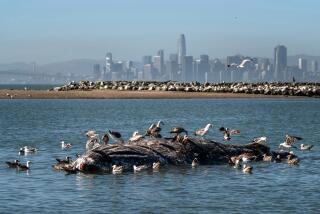Orphaned Baby Seals Get Love, Pureed Herring
SAUSALITO, Calif. — The winter storms that pounded the Northern California coastline this week left behind dozens of orphans.
Many of them are being temporarily sheltered at an old missile base here, where their injuries are treated and volunteers feed them regularly--with a mixture of pureed herring, whipped cream and crushed vitamin tablets.
The orphans are baby elephant seals separated from their mothers by heavy surf that swept into Ano Nuevo Reserve, the state-protected breeding ground of the seals in Santa Cruz County. Many of the surviving baby seals have been discovered along beaches by passers-by and brought to the California Marine Mammal Center here.
“The storms coincided with breeding season and unusually high tides,” said Peigin Barret, director of the center. “Many of the pups were separated from their mothers and drowned. We got the lucky ones here.”
Eight days ago there were no elephant seals in the center’s “orphanage.” By Thursday night, there were 15 baby seals--and more are expected.
Elephant seals, distinguished by their large, long noses and tough skin, are the largest animals in the seal family. Those that live along the California coast weigh 40 pounds at birth, grow to as much as 300 pounds in their first month and eventually weigh up to 500 pounds, according to mammal center officials. There are an estimated 15,000 along the coast.
Injured and Ill Animals
The private, nonprofit center, one of three marine mammal rehabilitation facilities on the West Coast--the others are at Marineland in Rancho Palos Verdes and Sea World in San Diego--gained some fame last year when it played a major role in the rescue of Humphrey, the humpback whale that strayed into San Francisco Bay and got lost in the Sacramento River delta.
More often, however, staff members and volunteers at the center are treating injured and sick pinnipeds--the order of marine animals with flippers. The animals are treated at the center until they regain their health and then are released into the ocean. The center, on the bay north of San Francisco, currently has 31 patients, including adult elephant seals and California sea lions.
Feeding time at the center sounds like a cross between a preschool and a chicken coop. Hungry baby seals give out short, throaty squawks, while sea lions bellow and snort.
The babies receive special treatment. Two volunteers, wearing slickers against the rain, enter the pen of a 60-pound baby named Bam-Bam. One wraps him in a blanket and holds him down while the other stuffs a rubber tube down his throat and into his stomach. Amid much squirming and snorting, Bam-Bam receives his herring, whipped cream and vitamin mixture.
Feedings take place every four hours around the clock.
For one hour each day the older pups attend “fish school,” a training program to teach them to eat whole fish.
“The whole idea is to mock as much as possible the natural environment,” Barret said. The seals are put in a small pool and a volunteer brings out a small fish and encourages the seal to play with it.
In the wild, elephant seal pups stay on the beach and nurse through their fourth week, and later begin to notice and play with the fish, eventually discovering that they are edible.
More to Read
Sign up for Essential California
The most important California stories and recommendations in your inbox every morning.
You may occasionally receive promotional content from the Los Angeles Times.










